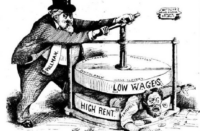As part of its continuing efforts to build unity among left and progressive forces, between socialists and republicans, the Peadar O’Donnell Socialist Republican Forum called for a united commemoration to honour Theobald Wolfe Tone (1763–1798), the founder of Irish republicanism.
Tone developed his political strategy in the belief that Irish democracy and the sovereignty of the people could be achieved only by mobilising the “people of no property” and winning the unity of people of all the religious traditions in Ireland and replacing division with unity brought about by the struggle for national democracy, sovereignty, and freedom.
The call made by the Forum was answered by people from a cross-section of radical organisations as well as individuals. Despite the inclement weather, people came from Cos. Donegal, Antrim, Derry, Tyrone, Fermanagh, Armagh, Cavan, Monaghan, Meath, Dublin, Wicklow, Down, Kildare, Cork, and Galway. The CPI had a strong turn-out for the event.
The march from Sallins to Bodenstown, to the graveyard where Tone is buried, was led by a colour party, followed by the Forum banner bearing the slogan Break the connection with imperialism. The Thomas Clarke Memorial Band played a selection from traditional airs and songs from the national independence struggle.
The commemoration was opened with greetings from Tommy McKearney on behalf of the Peadar O’Donnell Socialist Republican Forum, followed by a reading of the 1916 Proclamation by Frankie Quinn of the 1916 Societies. The poem “Tone’s Grave,” written by Thomas Davis in 1843, was read by Laura Duggan, and wreaths were laid on behalf of the various organisations, including one by Lynda Walker, national chairperson of the CPI.
“The International” was then sung—possibly a first for Bodenstown—to show that internationalism was a central feature of what the United Irishmen stood for and what shaped their thinking.
A call was made for building support for the boycott of Israel and for greater solidarity with the working people of Venezuela, struggling to defend their social and economic gains from the counter-revolutionary forces sponsored by the United States, and for building solidarity with revolutionary and anti-imperialist Cuba. All these struggles are seen as part of the historical political legacy of Wolfe Tone and the United Irishmen.
The chairperson of the proceedings, Eugene McCartan, introduced the guest speaker, John Douglas, general secretary of the trade union Mandate. In a wide-ranging oration he condemned the appalling housing and homelessness crisis now affecting every city and town in the Republic, and the continuing attacks on workers’ rights, as well as the narrow nationalist approach taken by some in relation to Brexit, rather than a pro-worker and internationalist position.
The chairperson described one of the central positions of the Forum, that the political institutions imposed by the British state when it partitioned the country had clearly failed and especially had failed workers, north and south. Partition had led to a carnival of reaction, as James Connolly predicted, which blighted the lives of working people, north and south.
The United Wolfe Tone Commemoration is yet another important step in the efforts of the Peadar O’Donnell Socialist Republican Forum to draw progressive forces together. Local forums are being established that draw people together to discuss and debate the nature of imperialist domination and struggle, to find the way forward that can challenge and defeat the triple lock of imperialism on the Irish people—the lock of Britain, the United States, and the European Union.
■ The next event to be organised by the Forum is a political school to be held in Belfast in late September, bringing together socialists, republicans and communists in a weekend of political lectures and talks.





